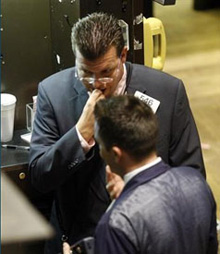
|  |  |  Business News | September 2008 Business News | September 2008  
ow Falls 300 Points Ahead of Bailout Vote
 Associated Press Associated Press
go to original


| | Stock traders cringe on the floor of the New York Stock Exchange. (Brendan McDermid/Reuters) | | |
New York - The Dow Jones industrial average fell more than 300 points, while demand for safe-haven buying in government debt remained high ahead of a planned House vote on an unpopular $700 billion plan to rescue troubled financial companies and as investors examined a deal for Wachovia Corp.

Wall Street is fearful the government's plan to buy up toxic debt wouldn't be sufficient to resuscitate nearly frozen credit markets.

Investors also reviewed the buyout at Wachovia. The Federal Deposit Insurance Corp. said Monday that Citigroup Inc. will acquire Wachovia's banking operations and that the deal protects Wachovia debtholders - a welcome prospect for investors given the strains in the credit markets. Investors had been worried about Wachovia's stability as it grappled with mounting losses over souring mortgage debt. Citi fell 21 cents to $19.94.

The news comes as President Bush and other congressional leaders looked to shore up support for the rescue measure, which they and many on Wall Street believe is a difficult but necessary choice to revive moribund credit markets. Banks and other financial houses are hesitant to lend to one another because of fears about bad mortgage debt on companies' books.

Tight lending conditions make it harder and more expensive for businesses and consumers to get a loan, which can hurt the economy.

While congressional leaders said they had the headcount to pass the vote - a Senate vote could come as early as Wednesday - investors were likely to remain unnerved until the votes are complete.

Investors also digested news that consumer spending in August fell to its lowest level in six months. The Commerce Department said consumer spending remained unchanged in August, rather than increasing 0.2 percent as economists had expected and the worst showing since February.

Personal incomes rose a better-than-expected 0.5 percent after falling 0.6 percent drop in July. But after-tax incomes fell by 0.9 percent. Incomes benefited in past months from the government's stimulus checks.

In the first hour of trading, the Dow Jones industrial average fell 333.88, or 3.00 percent, to 10,809.25.

Broader stock indicators also fell. The Standard & Poor's 500 index fell 39.97, or 3.30 percent, to 1,173.30, and the Nasdaq composite index fell 76.67, or 3.51 percent, to 2,106.67.

Credit markets remained strained Monday. The yield on the 3-month Treasury bill, considered the safest short-term investment, fell to 0.36 percent from 0.87 percent late Friday. The yield on the T-bill falls as demand grows; investors are at times willing to take the slimmest returns to safeguard their principal. The yield on the benchmark 10-year Treasury note fell to 3.70 percent from 3.84 percent late Thursday.

On the Net: New York Stock Exchange: http://www.nyse.com - Nasdaq Stock Market: http://www.nasdaq.com |

 |
|  |



